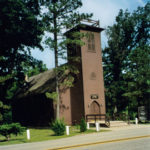The State Of Christian Fantastical Fiction 3: Church Clarifications

Old churches still show epic stained-glass artworks of the most fantastical Story of all. (Image credit: RGBStock)
More Christian fans of fantastical stories are getting disillusioned about sharing these with other Christians and the world. Therefore a first step to resolving this is to recognize our need for Christ’s Church in its God-given mission.
I thought saying this would bring challenges and objections, and I wasn’t kiddin’.
When I suggest, “We cannot take great, God-exalting beauties and truths (including stories) straight from individual Christians to the world by skipping over his organized Church,” and then, “It’s time to start asking the capital-C Church of Christ’s people how we can best help them,” there are some things I mean and things I don’t mean.
1. So should we ask church people what stories we can write for them?
No. That’s not my meaning for at least two reasons.
First, I’m addressing primarily fans of fantastical stories, then creators/producers of such stories first in their capacity as fans. When I suggested, “[ask] what [church friends] need from you as a fantastical fan or as an author,” this left the door open for the perennial view that Christian fantasy authors get things done mainly by writing fantastical stories, not mainly by enjoying and sharing fantastical stories (first others’, and then their own).
Second, as several commentators pointed out, many Christians in biblical local churches — which are part of the capital-C Church — have confused or incorrect views about what stories must do. These views include a) the “guilty pleasure” approach, in which Christians enjoy fantastical stories but feel others would condemn them, b) the “it’s all evil” approach.
Asking “What can I write for you (or folks like you)?” doesn’t address these core challenges.
2. What if my local church doesn’t get fantastical stories and songs?
Some SpecFaith friends said they could never share their love for fantastical stories in the local churches they know, without severe awkwardness or even spiritual condemnation.
In short this objection goes: My church friends don’t get fantasy or don’t get my love for it.
The solution starts with this: Yes. Yes, they actually do. They just don’t know it yet.
Their Book is full of fantasy. Their Gospel — the main Story of the book — is the ultimate “monomyth” in which a humble Hero on an epic quest trains, helps others, dies, then in a stunning plot twist slays the dragon anyway, returns to life and secures ultimate victory.
Alongside the Gospel the Book includes amazing miracles, ancient cultures, battles, and the fate of nations and ultimately the world. And ours is a religious faith grounded in all of this.
Fans may start planned “subversion” efforts by asking God to give you excitement for the Bible’s ultimate fantastical (yet true) Story of the Gospel. Then for church friends, we can draw more attention to the Bible’s most fantastical and strangest portions. Geek out over Jesus’s salvation, Moses’s miracles, Elijah’s taunts, Ezekiel’s visions. You might even start to work in some careful comparisons to pop-culture heroes who remind you of biblical truths. Even in healthful environments some people will give you odd looks. But that might not last as more people gradually realize you’re serious about being a geek about other stories and heroes so that you can better fulfill your chief end of loving the Gospel and the Hero Jesus.
3. What if my church stinks about building real-world friendships at all?
Other SpecFaith friends said the problem is even worse than “my church friends don’t get this part of me.” Instead their church is the sort in which they — or people altogether — are not even growing organized yet natural relationships in Christ. It’s all a big machine.
I wish I could offer some excuse or “prosperity gospel”-style formula to fix such situations.
I can’t.
I might suggest that sometimes people are more awkward in group situations, or certain religious environments, for other reasons besides “they are just rude and closed-off.”
But that’s not an excuse; it’s a mark of immaturity. Christ’s people must love one another in a diverse Body of Christ (the global Church) as organized into biblical local bodies of Christ (local churches). One-another love means learning and living and worshiping with people who enjoy all kinds of different things so far as they’re not actually sins.
If someone in a church enjoys fantastical stories (or doesn’t enjoy them), and gets the cold shoulder — e.g., worse than mere misunderstanding — that’s a sin.
All I can say is that I’m deeply sorry about and for churches where that happens.
This goes beyond the scope of this article, but one organization’s suggested “nine marks of a healthy church” does not include “The Right Views on popular culture and/or fantastical stories.” However, those nine marks do include biblical preaching/teaching and church membership with loving accountability — all based on the Gospel, the Story of the Bible that Jesus Christ saves and grows sinners. These biblical requirements will naturally lead to growth in love among diverse people, along with more-biblical views on stories and songs.
What if a church doesn’t care about Gospel-centered teaching, membership and all the rest?
In some cases Christians may need to seek other churches if they’re available. Our reason ought not be, “Because they don’t get the stories I love.” Our reason ought to be, “Because this church from the top down doesn’t get the Gospel, the Story of the Savior Whom I love.”
In other cases Christians may need to work with what they have, even in churches that don’t (yet) really care for the Gospel Story. This is annoying, but part of living in a groaning age in which the Church and local churches aren’t yet what they ought to be. For God’s sake —not first for geekhood’s sake — make do with your own Bible study, internet ministries, online sermons, and relationships with people who do want to regard the Gospel highly.
And in other cases, a church may be seeking Gospel-centeredness but its members don’t yet smile (even with amusement) on geeky Christians. Now the task becomes greater: You are on a quest in strange territory. Time to prove your devotion to Christ and find out how you can serve this tradition-laden land and earn people’s trust. Or as Michelle R. Wood said:
I’ve always found in any organization that work talks louder than talk. Be integrated into the church through ministry: offer to teach, offer to serve, offer in whatever way you can. Trust me, there is not a church on this planet (or nonprofit for that matter) that will turn away a dedicated volunteer. People are far more willing to listen and work with you when you’ve shown you’re willing to listen and work with them.
And you may be surprised what you find once you peel back the surface and really start talking to people, including the fact that they’re already fans to begin with.
Again, this may not always work. And in that case, you’re more than welcome to share your stories here and find community empathy and support.
Next week: Geeky fans sometimes do find a place in a local church and can begin to share the stories they love. It happened to me, anyway, and I hope to share some of my own story.







































My church has been a bit uneasy about “geeky” things in the past, which is why I, as a lifelong attender and daughter of two people who are respected there, feel it’s kind of my duty to be open about my geekiness. Everyone already knows I’m “orthodox”, so when I say stuff or express enthusiasm for stuff that is, to someone’s mind, unusual, they’re more likely to discuss it than dismiss it – or me.
(This is the value of staying put and following tradition: when change needs to happen, you can help lead the way because “hey, this person doesn’t just rebel for rebellion’s sake, maybe there’s something to this.”)
Slow clap to this.
Some people may view the word “orthodox” or “tradition” with negative connotations. If that’s the case, try “translating” it into fantasy terms. It’s “orthodox” — e.g., a given — that fantasy stories ought to include some kind of magic, and it’s “tradition” — e.g., a long-developed trait that everybody usually likes — that a fantasy novel has a great big ol’ map in the front.
The primary issue seems to have evolved from “How can we meet the church’s needs?” to “How can I convince people in the church to take an interest in what I enjoy?” to “How can I gain acceptance within the church, enjoying what I enjoy?”
And it’s easy to fall into a mindset that if the church doesn’t rock to our particular beat, there’s something wrong with it, which perhaps brings the reasoning full-circle: “I like fantastical stories, the Bible is full of fantastical stories, but the church doesn’t enjoy fantastical stories, so the church doesn’t properly appreciate/understand the Bible, the Gospel, or me. To fix the church, I need to help it learn to love fantastical fiction.” We often see a similar sentiment with regard to music–substitute “hymns” or “contemporary Christian music” for “fantastical stories.” If we’re not careful, we may begin to see affinity for fantasy fiction or anything else we enjoy and value as a spiritual litmus test.
For example, the local demographics and wider community culture may lend itself to a fellowship where everyone’s more tuned into sports than literature, and the place is awash with perfectly functional and useful sports-based stories and spiritual metaphors, complete with the equivalent of Hero’s Journeys and all the rest. Spec-fic may do a better job connecting with my heart than the tale of Rudy Ruettiger, but that doesn’t mean either the church or me are messed up. We’re simply wired for different metaphors, and I agree it can get pretty lonely if you’re in the minority that’s all lit up about Peggy Carter’s latest adventure while the rest of your congregation is speculating about Peyton Manning’s prospects for next year.
Michelle’s and Andrea’s advice is solid: be yourself, do what you can to be involved in the work and fellowship of the church, and don’t be afraid to talk about what draws you closer to God. There’s value in learning more about the majority culture, too…hey, there’s a whole sub-genre of spec-fic sports stories. 🙂
Not my intent — especially after part 1 took us all (starting with myself) to ask for accidentally making this whole pursuit about individuals.
My whole premise is based on the biblical concept that Christians ought to be on mission to train up more eternal worshipers of God, a mission that only begins the call to repentance and salvation yet goes much further.
Fantastical story-appreciation can be part of that mission. Or as said above:
I do contend that local churches whose members do not understand this, who have a “this has nothing to do with my faith” view of anything in pop culture, could use some growth in this area. This is not about making us as individual Christians happy to be geeks with all our happy friends in a cooler local church. It’s much more about learning to have our hearts and minds transformed to be more like Christ’s in every area — again, so that we can fulfill that purpose of loving and worshiping Him more than our sin.
Amen. But the more I consider it, the more I realize that my current problems with my local church aren’t just one topic, but a tangled knot of topics aren’t half so simple to work out…
Exactly. Social barriers, theological problems, as well as not having friends with the same interests. It’s tanged. That’s why I’m not sure of the relevance of my experience. Maybe if I were simply more socially competent I could tell the people at my church how great speculative fiction is for expressing universal truth. One church member pointed out the irony of my studying communication in college when I have trouble communicating with other people in person.
Exactly! So, I’m an English major who attended a school that requires a Bible minor. And in Sunday school one day, someone brought up that the Bible is unique, not like any other book.
And I, very hesitantly and very disclaimer-fully, pointed out that we still need to be aware of genre distinctions, and that trying to read James in the same manner one reads Psalms…and the first person just repeated what they’d said before. With that sort of response to a fairly non-controversial topic, I’m not very likely to bring up anything more complex.
When I say stuff that’s only borderline controversial, I usually get either the awkward silence or the nods accompanied by weird looks. But like you, I try to contain myself as much as possible. For most of my life I’ve never voiced my opinions or convictions. The few times I’ve let it out and started an argument were rare exceptions. Those instances confirmed my usual practice of not contributing to discussions. It’s probably not edifying.
Not saying that you shouldn’t, though. Sometimes speaking up may be the right thing to do, even though it’s hard to argue spiritual matters in a good way. I honestly don’t know whether I’m too confrontational or too reserved.
Second that Fred: hey, I watch the Super Bowl with my family every year that I don’t have a theatre obligation, not because I care much, but they do and I enjoy being with my family.
PS: I’m lit up about Peggy Carter!
Yeah, Peggy rocks. I like the 1940’s setting and that her superpower is basically super-competence, sort of like Coulson. Jarvis is also a lot of fun and I’m enjoying the way they’re slowly unpeeling his hidden strengths and challenges. Love his devotion to his wife, also.
I probably know where you’re going with this. Churches that do nothing other than demand more evangelism and Bible reading love the Gospel too little, not too much. If they loved the Gospel more they could see it come alive within culture, storytelling, friendship, etc. I’m totally onboard.
That aside, there’s nothing we can say if we tell this to church people and in response we get a genuinely non-judgmental shrug and a reply that amounts to, “That’s well and good, but I’m just a simple Christian, and I really am only about the Gospel all the time, and that’s the way I like it, and everything else is just distracting and annoying to me.”
That’s somewhat the response I got from my pastor after a lengthy email exchange about my theological problems. But my problems with my church are about theology rather than geek stuff specifically, so I guess can’t talk about it here.
Just—I was even more disappointed that the couple teaching my Sunday school class hadn’t heard of William Lane Craig than that they don’t like Tolkien (not for spiritual reasons, just preference). I expected that they might like some of what Craig says, if they think in those terms.
That’s no problem brother. Please feel free to share.
Seconded. Can we just have a post sometime to discuss church in general?
So the church topic is close enough.
There has been some amount of hostility when I voiced my inclination toward inclusivist theology and my problems understanding the notion of the Bible as the word of God. Maybe it’s my “sinful human wisdom” leading me toward inclusivism, but I can say with certainty that my concern about the Bible being exalted as the Word of God ahead of Christ came from my own study of Scripture. I need everything true to be universally true. I’m sorry that I can’t be simple about faith. I know I would be a better Christian if I could be, but I can’t.
That’s also why I love speculative fiction and why I’ve delighted in the message of glorifying Christ in common cultural activities ever since I’ve encountered that message on the Internet. I don’t need to explain here how speculative fiction is such a fantastic vehicle for common and universal truth. I wouldn’t expect any church to be big on speculative fiction, as I don’t think that’s the church’s job. I do wish my own church emphasized the universal glory and presence of God more often (or really at all). Maybe the lack of geek interest among the congregation is symptomatic, but I don’t think we’re qualified to make that determination.
Let me sum this up to make sure I am understanding it right.
1. To make for healthier Christian attitudes to spec fic, Christian fans (and writer-fans) need to step up.
2. They need to volunteer in their local churches and essentially earn people’s trust as orthodox Christians.
3. This done, now they can make steps to point out the parallels Christian faith has with fantasy, i.e. supernatural happenings, monomyth, etc.
4. This will awaken more openness to spec fic in a fan’s congregation.
5. If enough fans do this, spec fic will be revitalized from the ground up.
-not addressing the “leave if you have to issue.”
***
I don’t see this working.
I mean dude, come on. Something as big as promise keepers which more or less had the same method (motivate men to be better forces in the local church) couldn’t even do this long term, and now it seems men’s participation is less not more. I just don’t see this as possible.
Since Steven summed up with a quote from me, I’ll try to respond what I believe (he, of course, can answer for himself :)).
I do not mean to ever suggest that people “infiltrate” a group simply in order to get their views across, forming a fifth column a la HYDRA/SHIELD in order to one day rise up and rule (hyperbole fully in play peeps). Put quite simply, that’s silly and naieve and, as pointed out, probably ain’t gonna work. Nor do I think it a productive use of anyone’s time (Christian or otherwise).
Counter example: I’m not in theatre because I feel called to serve as a missionary to the poor lost souls there. I’m in theatre because I love being on stage and reading new plays and geeking out about musicals and even working late nights up on a lighting grid. But I am also a Christian, and fully realize the responsibility I have as His child in a world surrounded by people who have little to no appreciation for God or His Kingdom.
I don’t spend a lot of time and energy worrying about finding moments to evangelize here: I simply try to serve as a good ambassador by doing my job, treating others well even when they don’t do the same, etc. But I don’t censor myself regarding the fact that I attend church including early services when we have tech that day: in fact, I’m usually extra peppy (or try to be) due to coming off a service where I try to gain the encouragement I need to get us through what’s usually the roughest part of the production.
It helps that I genuinely enjoy both spheres of influence: theatre and the Church. Do I love every single minute of either environment? Nope. There are times I can’t wait to get out of the theatre, just as sometimes I struggle to get something meaningful out of a sermon. But that doesn’t mean I want to leave either fellowship: it means I have to continually come back to what I enjoy and love about them, pray for humility (in my case, a LOT of humility), and then ask God to instill me in me the right attitude to jump back into things.
I’m also extremely grateful to all my church families I’ve experienced who’ve been nothing but supportive of my odd theatrical life: many have attended my performances, all ask about them and want to know what my latest project is, and they’re very understanding of my absences when I have to attend elsewhere in order to make an early call. Then again, I try to in my turn be support of them, listen and pray for their concerns as relates to regular 9/5 work and kids that I don’t have, and serve as an on-call kids volunteer when I’m available since my schedule doesn’t allow me to make a steady commitment to be there every Sunday.
That’s a really long story to say: no one should ever approach their local church body as a place to poach new converts for new pet hobbies. We go to church because 1, God commands us to, and 2, to support and be supported by a local fellowship of believers. I can honestly say that attending early services (or evening ones depending on the time of my call) on days when I’ve got to work in the theatre is vital toward getting any negativity I’ve worked up out of my system and resetting my attitude, not only toward God but my art and fellow artists.
I love geekdom, but sometimes the flame wars and angst get too much even for me, and it’s good for me to enter a space where no one’s arguing Trek v. Wars for the upteenth time or worried about whether the publishing industry is too discriminating toward fill-in-the-blank underrepresented population, not because I don’t care about these issues, but because it’s good to get things back in perspective. That being said, I have no issue during Sunday School bringing up that I think the theory of multiple universes reconciles God’s sovereignty and man’s free will, or that Spider Man 2 helped me through a particularly rough spiritual moment in my family’s life. I’ve never yet met someone who thought I was in the wrong to say so, and I’ve attended nothing but country conservative churches all my life. I’ve felt loved and respected, even if people didn’t always understand me, and I’ve tried to show love and respect in return, even if I don’t always understand them. That’s what the Kingdom of God is all about.
I never thought about trying to “convert” anyone to a different taste in fiction or to my love of theatre. I just exist as that part of God’s body, remembering that we all serve different functions. However, I’ve found through the years that most people are more complex and into different fandoms than first meets the eye.
Just recently at church I was talking with an older woman before Sunday School (I’m the youngest member by probably five to ten years), and she mentioned a movie she and her husband recently attended. They didn’t care for it, but in our discussion she explained that they loved the Bourne movies and anything with suspense/action. These are two loving older members who most be probably think are just sleepy (read boring) sheep in the congregation, and yet here she was geeking out about spies and thrillers. I recommended Steven James (a Christy-winning novelist) and some other works she might like in that vein. We bonded over something I never would have thought we shared in common.
It’s not about finding people to assimilate. It’s about meeting people where they are with the love of God, having the humility and compassion to be interested in people for the sake of who they are and not what they can do for you, and authentically living your life in a way that’s pleasing to God and respectful to his Church (including the part of you that’s into dragons and spaceships and whatnot). Getting people on board with my agenda isn’t really part of the program. Serving and engaging and then being blessed by discovering fellow travelers along the way is.
But then we’re completely off the point of the posts, which is the state of Christian spec fic. The stuff listed above is supposed to be the correct way to stoke interest in it, and it seems we’ve gone past that to “well, it’s not that important anyways, so just be a good churchgoer” with your response
You’re probably right, I tend to be bad at evangelism of any kind. That’s why I admire Steven’s zeal and call to speak about these issues, even if I may quibble about the details. I’m certainly not the best person to lead a revolution of any kind.
That being said, I wasn’t trying to indicate these ideas were unimportant. I love geeking out about stuff, and I certainly spend a lot of time and energy on spec fic/media. I’m not shy about sharing my love of these concepts with others, including at church. I share and plug books with people who I think will like them (hence my discussion of the lady at my church who liked the Bourne movies). I guess I tend to be in the slow burn, relationships, conversation realm, and if it comes up I’ll be happy to share with any who express interest. I’m a lot more aggressive about pushing stuff online in forums like this, where I assume there’s already a desire for it.
Also, final coda: I tend to feel like we should be “good churchgoers” and work in our local congregations regardless of what it does for us personally, simply because we should be Christians first, geeks second.